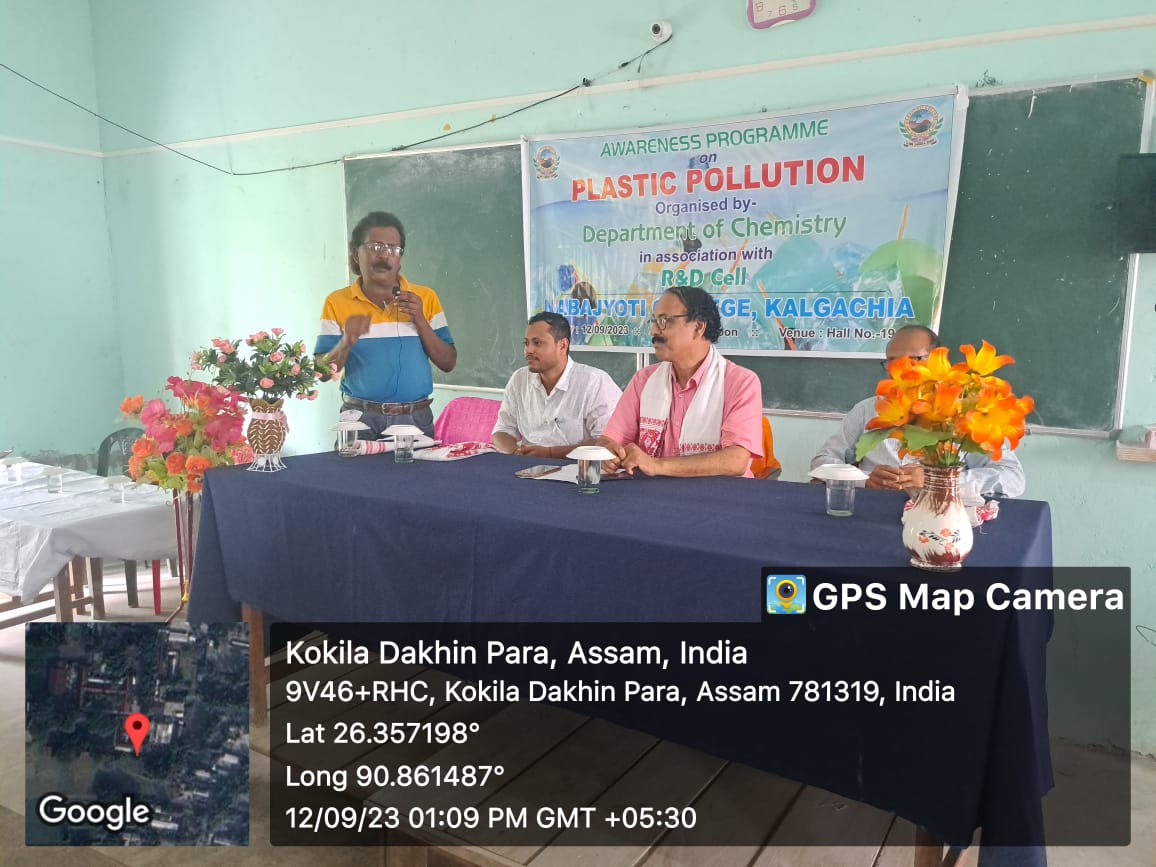Date: September 12, 2023
Location: Nabajyoti College, Kalgachia
Organizer: Department of Chemistry, Nabajyoti College, Kalgachia in association with R&D Cell, Nabajyoti College, Kalgachia.
Speaker of the session: Dr.Debashis Saikia, Department of Physics, Nabajyoti College, Kalgachia

Executive Summary:
Plastic pollution has become a pressing global issue, posing severe environmental, health, and economic challenges. To address this crisis, an awareness programme was organized to educate and engage students of Nabajyoti College, Kalgachiain understanding the consequences of plastic pollution and promoting sustainable practices. This report outlines the objectives,Programme Highlights, outcomes, and recommendations of the awareness programme on plastic pollution conducted on 12.09.2023.
- Introduction:
Plastic pollution is a growing global concern with far-reaching implications for the environment and human health. Single-use plastics, improper disposal methods, and inadequate recycling practices have led to the accumulation of plastic waste in our oceans, landscapes, and ecosystems. To combat this issue, an awareness programme was initiated to inform and mobilize the students of Nabajyoti College, Kalgachia.
- Objectives:
The primary objectives of the awareness programme on plastic pollution were as follows:
- To create awareness and educate the students of Nabajyoti College, Kalgachiaabout the environmental impact of plastic pollution.
- To encourage responsible plastic consumption and disposal practices.
- To promote recycling and the use of sustainable alternatives to plastic.
- Programme Highlights:

3.1. Inaugural Session:
The awareness programme was commenced with an inaugural session where Dr. Shahjahan Ali Ahmed, Principal, Nabajyoti College, Kalgachia, Kumaruzzaman, Academic Observer, Nabajyoti College, Kalgachia and Hanif Mustaque, HOD, Department of Chemistry, Nabajyoti College, Kalgachia delivered an insightful talk on the importance of creating awareness among individuals for tackling global Plastic Pollution.
3.2. Insights of the speech of the keynote speaker:
The speech of the session was delivered by Dr.Debashis Saikia, Department of Physics, Nabajyoti College, Kalgachia. The insights of the speech were as follows:
- Global Issue:
Plastic pollution is a pressing global environmental concern. It refers to the accumulation of plastic waste in natural environments, causing harm to ecosystems, wildlife, and human health.
- Pervasive Problem:
Plastic pollution is pervasive and affects every corner of the planet. It can be found in oceans, rivers, forests, and even remote areas, highlighting the need for awareness.
- Environmental Impact:
Plastic pollution disrupts ecosystems by contaminating soil and water, leading to soil degradation and the release of harmful chemicals. It also poses a severe threat to marine life, with millions of marine animals dying each year due to ingestion or entanglement in plastic.
- Health Risks:
Humans are not immune to the effects of plastic pollution. Microplastics, tiny plastic particles, have been found in the food we consume and the air we breathe, raising health concerns.
- Long-lasting Persistence:
Plastics take hundreds of years to decompose fully, contributing to the enduring nature of the problem. Increased awareness can help reduce plastic consumption and disposal.
- Reduce, Reuse, Recycle:
Promoting the 3 Rs—Reduce, Reuse, and Recycle—is crucial in mitigating plastic pollution. Awareness campaigns educate individuals on the importance of these actions.
- Alternatives:
Raising awareness about sustainable alternatives to single-use plastics, such as reusable bags and containers, encourages eco-friendly choices.
- Corporate Responsibility:
Encouraging companies to adopt sustainable packaging and production practices is essential. Public awareness can lead to consumer pressure for change.
- Legislation and Policies:
Public awareness can drive the creation of stricter regulations and policies to curb plastic pollution. Advocacy for such measures is vital.
- Individual Action:
Ultimately, awareness empowers individuals to take responsibility for their plastic consumption, making conscious choices to reduce their plastic footprint.
- Education:
Incorporating plastic pollution awareness into school curricula and community programs helps instill a sense of responsibility from a young age.
- Collective Action:
The collective efforts of communities, governments, businesses, and individuals are essential in addressing plastic pollution effectively. Awareness serves as a catalyst for this collaborative approach.
In summary, awareness of plastic pollution is pivotal in combating this global crisis. It informs individuals, influences behaviour, drives policy changes, and fosters a collective commitment to preserving the environment for future generations.
3.3. Interactive Discussions:
After the speech of the keynote speaker an interactive session was held in which students engaged in interactive discussions and case studies with all the speakers, allowing them to address specific challenges and share their insights into tackling the issue of plastic pollution.
- Outcomes:
The awareness programme on plastic pollution yielded several positive outcomes:
- Increased public awareness: A significant portion of the target audience became more informed about the harmful effects of plastic pollution.
- Behavioural change: Many participants suggested and vowed to adopteco-friendly practices such as reducing single-use plastics and recycling.
- Recommendations:
Based on the experiences and lessons learned from the awareness programme, the following recommendations are made for future initiatives:
- Strengthen education: Continue to educate communities, schools, and businesses about plastic pollution and sustainable alternatives.
- Infrastructure development: Invest in recycling infrastructure to make recycling more accessible.
- Policy support: Advocate for and support policies that reduce single-use plastics and promote recycling.
- Public-private partnerships: Encourage collaboration between government, businesses, and NGOs to tackle plastic pollution collectively.
- Long-term commitment: Ensure the sustainability of awareness programmes through continuous engagement and follow-up activities.
- Conclusion:
The awareness programme on plastic pollution has made significant strides in educating and mobilizing students to address this critical environmental issue. While challenges remain, the outcomes demonstrate the potential for positive change through education and collective action. By continuing to raise awareness and promoting sustainable practices, we can work towards a future with less plastic pollution and a healthier planet for all.



